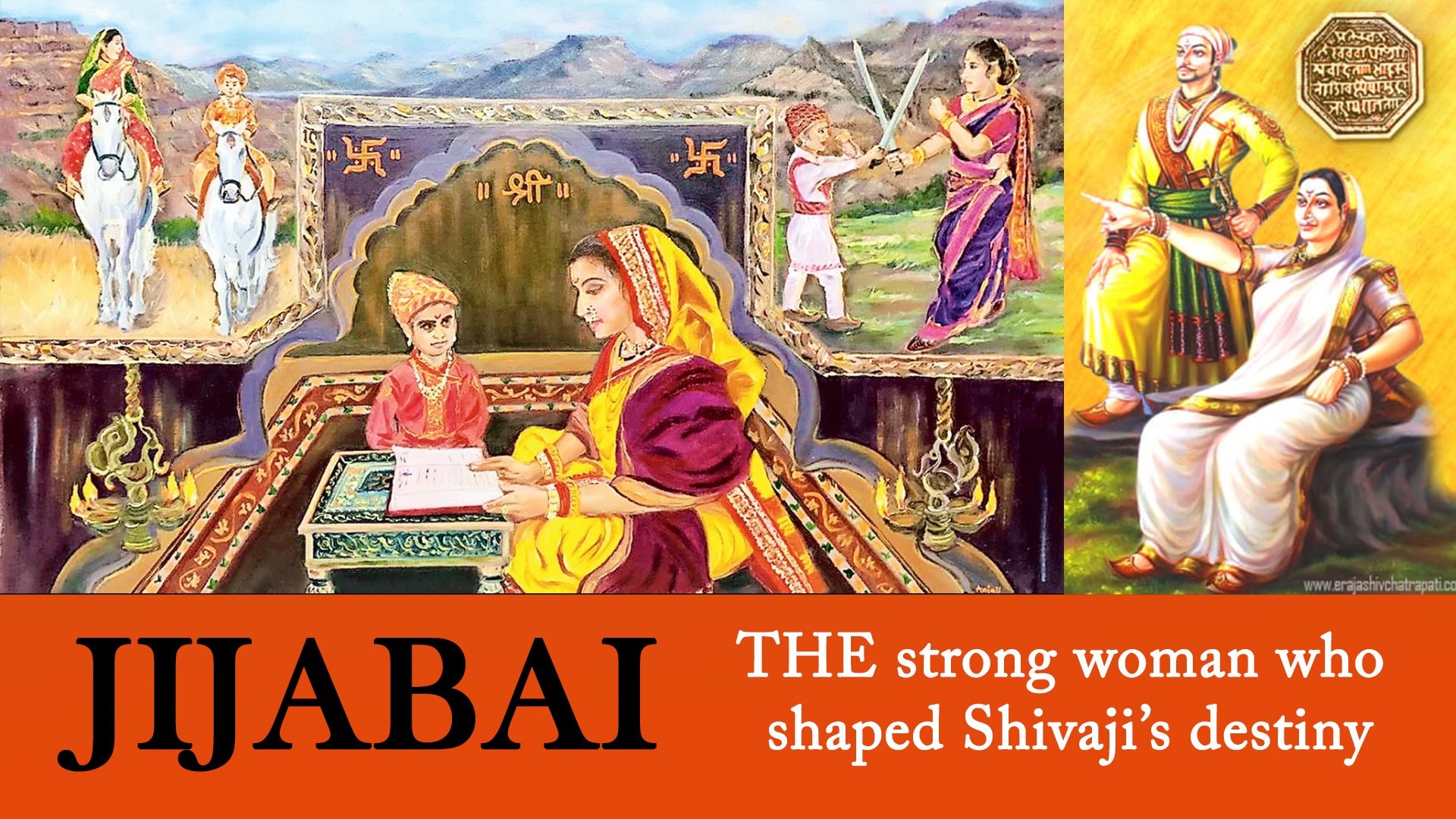In the windswept hills of Maharashtra, where the Sahyadri mountains stand as silent sentinels, a woman carved her name into eternity. Jijabai Shahaji Bhonsale, revered as Rajmata Jijau, was the mother of Chhatrapati Shivaji Maharaj, the lion who birthed the Maratha Empire. But she was more than a mother—she was a warrior, a dreamer, a nurturer of a nation. With her heart anchored in dharma and her spirit forged in sacrifice, Jijabai raised a boy who became a legend, single-handedly revived a ruined land, and lived a life that shames the hollow cries of modern pseudo-feminists. Her story, woven with the devotional poetry of the Bhakti Andolan, flows like a river—gentle yet unstoppable, soft yet unbreakable.
A Childhood Steeped in Valor and Virtue
Born on January 12, 1598, in Sindkhed Raja, Jijabai was the daughter of Lakhuji Jadhav and Mhalasabai, a couple rooted in Maratha pride. From her earliest days, Jijabai’s world was alive with stories of heroes and gods. Her mother sang of Rama’s honor and Krishna’s wisdom, filling her young heart with dreams of dharma. While other girls played, Jijabai learned to wield a sword, ride horses, and navigate the intricate dance of politics in her father’s court. Her education was vast—Sanskrit scriptures, the art of warfare, and the bhajans of saints like Tukaram and Namdev shaped her mind and soul.
The Bhakti Andolan, a wave of devotion sweeping India, was her spiritual compass. Jijabai embraced its teachings of equality and surrender to God, seeing herself as a servant of Goddess Bhavani. Her faith was not loud but deep, a quiet flame that lit her path through every storm. Even as a child, she dreamed of a free Hindu kingdom, where her people could live with dignity, unshackled by foreign chains.
A Marriage of Dreams, a Sacrifice for Swarajya
Jijabai’s marriage to Shahaji Bhonsale was a union of two fiery hearts united by a shared vision—Swarajya, the dream of self-rule. Together, they imagined a Maratha kingdom free from oppression, but fate demanded sacrifices. When Shahaji signed a treaty with Adil Shah of Bijapur, he was bound to serve in Bengaluru, far from his family. Jijabai, with wisdom and grace, convinced Shahaji to marry Tukabai, a political alliance to strengthen their position for the greater cause of Swarajya. Her heart bore the weight of this choice, but she placed her dream above personal pain, her eyes fixed on a free Maharashtra.
Pregnant with Shivaji, Jijabai was left at Shivneri Fort, surrounded by loyal aides but far from her husband. The world might have called her alone, but Jijabai was never truly alone—her courage was her shield, her vision her strength. When her elder son Sambhaji was killed by Afzal Khan, her grief was profound, yet she did not seek vengeance. She knew Swarajya demanded sacrifices, and she offered her pain to the altar of dharma, vowing to raise Shivaji as the torchbearer of their dream.
Reviving Pune: A Mother to the Land
When Shahaji entrusted the Pune jagir to Jijabai and young Shivaji, the land was a shadow of itself—fields barren, villages empty, hope lost to the Nizam’s raids. But Jijabai, with her boundless spirit, turned desolation into abundance. She walked among the people, her presence a promise of better days. With Dadoji Kondadev by her side, she rebuilt Pune, coaxing farmers back to their fields, restoring markets, and breathing life into the soil. Legend tells of Shivaji driving a golden plow at her command, a symbol of renewal under her watchful eyes.
Jijabai’s administration was a marvel of fairness and foresight. She settled disputes with wisdom, united feuding Maratha sardars through diplomacy, and governed with a mother’s care. She built the Kasba Ganpati temple and restored sacred sites like Tambdi Jogeshwari, weaving faith into the fabric of her rule. Her compassion was boundless—she mourned every fallen soldier as her own, fed the hungry, and sheltered the weak. To her subjects, she was not a ruler but a mother, her heart big enough to hold them all.
A Warrior’s Fire, a Teacher’s Love
Jijabai was a warrior in every sense. Trained in swordsmanship and horse-riding, she could lead armies and wield a blade with skill. When Shivaji faced danger, such as during the siege of Panhala, Jijabai stood ready to fight, her spirit as fierce as any soldier’s. Yet her greatest battlefield was the heart of her son. She raised Shivaji single-handedly, becoming both mother and father, her love a blend of steel and softness.
Every evening, Jijabai would sit with Shivaji under the starlit sky, narrating tales from the Ramayana, Mahabharata, and the valor of Rajput warriors. Shivaji, curious and bright, would ask questions—Why did Rama fight? How did Krishna outwit his enemies? Jijabai answered with patience, teaching him the art of guerrilla warfare, the importance of strategy, and the courage to stand against injustice. “Be strong like a lion, Shivba,” she would say, “but let your heart be soft for the suffering.” She instilled in him values of justice, respect for women, and tolerance for all faiths, shaping a king who was both iron-willed and compassionate.
The Bhakti Andolan: Her Spiritual Haven
The Bhakti Andolan was Jijabai’s anchor, its songs of devotion echoing her own heart. She found solace in the abhangas of saints like Tukaram, whose words spoke of surrender to God and service to humanity. Though no abhangas are directly dedicated to Jijabai, the poetry of Janabai, a Varkari saint of her time, mirrors her spirit—humble, strong, and devoted. One of Janabai’s abhangas captures this essence:
Marathi Original:
“जनी म्हणे विठ्ठल माझा बाप, माय माझी भवानी |
सर्व सुख त्याच्या चरणी, मी त्याची दासी खाणी ||”
Transliteration:
“Jani mhane Vitthal maza baap, may mazhi Bhavani |
Sarva sukh tyachya charani, mi tyachi dasi khani ||”
Meaning in Simple English:
“Janabai says, Vitthal is my father, Bhavani my mother. All happiness lies at their feet, I am their humble servant.”
Like Janabai, Jijabai lived as a servant of Bhavani, her faith a source of strength. She prayed for Shivaji’s safety, her nights filled with bhajans, her days with action. Her devotion was not mere ritual—it was a living force, guiding her to treat all as equal, to fight for the weak, and to nurture a kingdom rooted in dharma.
A Legacy That Redefines Strength
Jijabai’s life is a quiet rebuke to those who mistake noise for power, who claim strength without sacrifice. She was a strong woman in the truest sense—not because she demanded equality, but because she embodied it. She ruled with wisdom, fought with courage, and loved with a heart that knew no bounds. Her power came from duty, her greatness from humility. She was a mother to Shivaji, to his comrades, to her subjects, her compassion a bridge between ruler and ruled.
Her wisdom lay in her balance—she was fierce yet forgiving, commanding yet kind. She taught Shivaji to honor women, to punish injustice, and to build a kingdom where all could thrive. Her diplomacy united sardars, her administration rebuilt Pune, and her warrior skills inspired awe. Yet, she remained humble, her life a prayer to Bhavani, her every step a stride toward Swarajya.
The Final Triumph: A Dream Fulfilled
Jijabai lived to see her son crowned Chhatrapati in 1674, the golden moment when Shivaji ascended the throne at Raigad Fort. Her dream of Swarajya, shared with Shahaji and nurtured in Shivaji, had come alive. But her work was complete. On June 17, 1674, just eleven days after the coronation, Jijabai passed away in Pachad village, her soul at peace. Shivaji wept, for he had lost his greatest guide, the woman who shaped his destiny.
Jijabai’s legacy lives in the Maratha Empire, in the forts of Maharashtra, in the songs of bards. She was a woman who turned sacrifice into strength, who raised a boy into a legend, who showed the world that true power lies in serving others. To call her a feminist is too small—she was a force of nature, a mother to a nation, a warrior of the heart. In her life, we find a truth that echoes through time: a woman’s strength is not in her voice alone, but in the dreams she builds, the lives she shapes, and the love she gives without measure.





